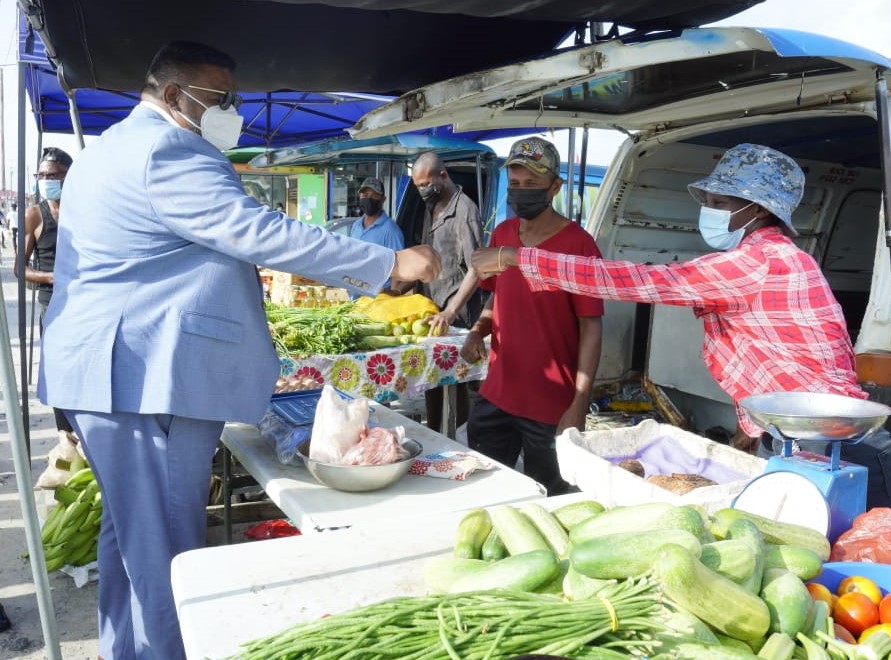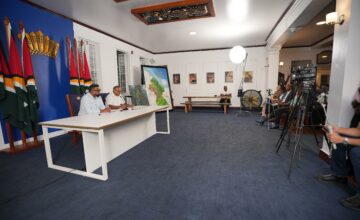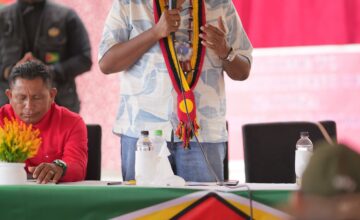
— Assures that every Guyanese will benefit from Government’s development agenda
Supenaam, Region Two — (September 10, 2021) His Excellency Dr Irfaan Ali this afternoon made a passionate plea for Guyanese to forget their differences and to work together to build a better Guyana.
During a meeting with residents from Region Two at the Supenaam Stelling, the President said that there is a need for citizens to transition from “I to we” thinking and to see each other as just Guyanese.
“All I want us to be is just Guyanese. We must be proud of our heritage, it is part of us. But we are part of a society that is blended together and is referred to as a society of Guyanese. The greatest accomplishment that I look forward to is for our people to come together under the umbrella of One Guyana and embrace the opportunities that will come your way under One Guyana.”
President Ali said that when that is achieved, Guyana will have the stability that will give the country greater opportunities to attract investments.
“That is the foundation on which our message is built on. That is the foundation on which our agenda is developed on. That is the foundation the policies and programmes to improve the lives of fellow Guyanese are based on. And that is the foundation that drives the agenda to protect every Guyanese.”
He explained that his Government’s development agenda will fall under the umbrella of ‘One Guyana’ and will cater to every resident of Region Two, and by extension every citizen of the country.
FREE EDUCATION
President Ali underscored that one of the ultimate goals of his Government is to give Guyanese access to free tertiary education.
He further explained that the impetus to free education has already started in Region Two, given that out of 6000 plus online scholarships that were awarded through GOAL, over 500 of them are from Region Two.
The Head of State said that this will be compounded by investments and upgrades in infrastructure that will allow persons to further their education in the comfort of their homes.
“Investment will allow every child the same access to the same quality of teaching.”
He said that this will be fixed with the upgrade in technology and that his Government will build an online platform that will allow teachers to teach all children across all regions and in all areas of the country.
“These are the things that bridge the gap of inequality and offer opportunities to all people under the One Guyana platform. We cannot be differentiated by our rate of learning or ability to learn.”
JOB CREATION
The Head of State also announced that his government has a bigger plan for job creation in the Region and that in the next budget, resources will be set aside to open up more than 5000 new acres of land for persons to become entrepreneurs.
“And we will work with you in putting in process facilities to support the local economy.”
COVID-19 AND EDUCATION
President Ali also used the opportunity to implore the residents to get inoculated against COVID-19.
He emphasised that the current vaccination policy does not make the vaccines mandatory, but that it helps to save lives.
“I have a responsibility, the Government has a responsibility, and the science is clear. Having the vaccination does not mean you cannot get COVID but what the vaccination does is reduces the chances of you dying by more than 95% and that is good enough for me. It reduces your chances of being hospitalised. 98% of all the deaths are among unvaccinated persons. Isn’t this enough statistics, I implore you my respected brothers and sisters to think carefully. I implore you to think about your children, your families, your communities and your responsibility to your families and communities in addressing the issue of vaccination.”
The President said that because of the pandemic, more than one and a half years of learning have been lost. He said he is aware that the pandemic has resulted in dropouts and that if Covid-19 is not controlled the dropout rates can increase dramatically.
“Policymaking and policymakers have to take all of these circumstances into consideration when we develop and design policies and programmes. It is not easy for the population, it is not easy for the policymakers. But we have to look at all the circumstances and take the middle road.”


